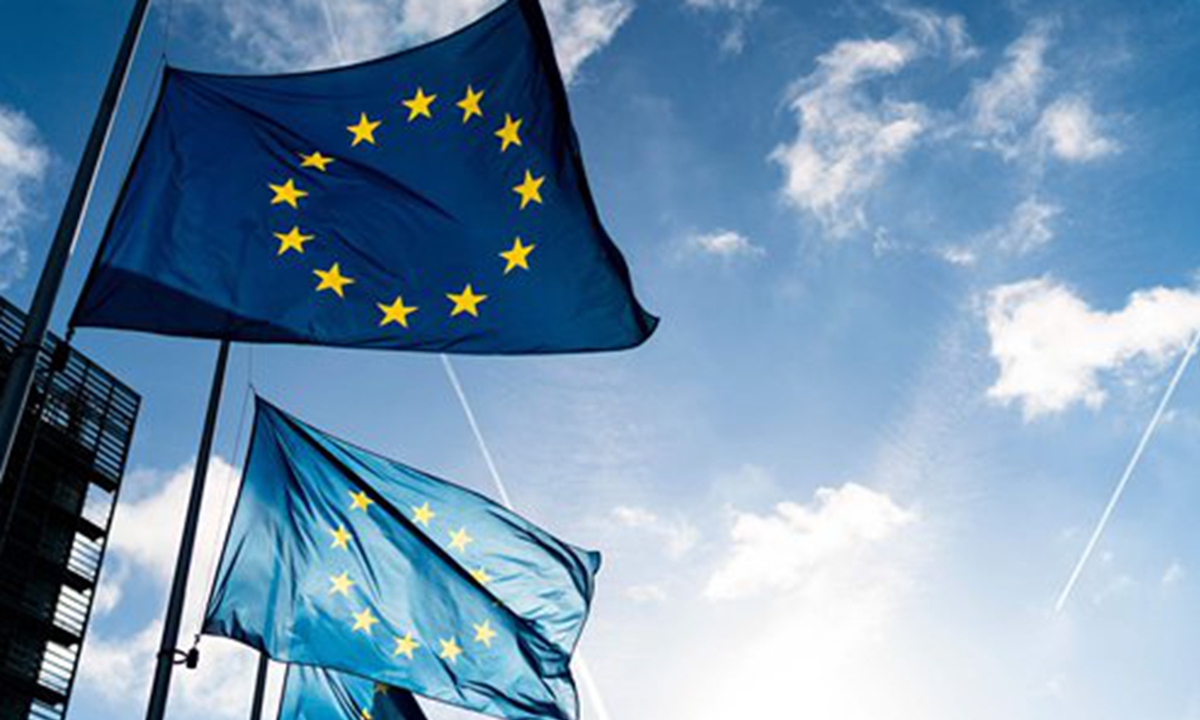
Photo: VCG
As France will take over the presidency of the Council of the EU on January 1, 2022, President Emmanuel Macron has been travelling in Central and Eastern European countries (CEECs), trying to ease the sharp contradictions between East and West Europe.Amid Macron's first stop in Budapest on a visit to enlist the unpopular Hungarian Prime Minister Viktor Orbán, Macron even attended a summit of the four Visegrad countries - Hungary, Poland, the Czech Republic and Slovakia - to reduce difficulties from CEECs during the French presidency.
The appeasement of France and Germany came after the irreconcilable conflicts between the EU and CEECs like Poland and Hungary on critical issues, such as the rule of law crisis, finance, security, refugees and energy. The EU has not yet lifted the suspension of disbursement of EU funds to Poland and Hungary, which hold the position that the country's domestic law takes precedence over EU law. The bloc has constantly trapped in the geopolitical differences between CEECs and Western Europe, and the entanglement of interests between Old Europe and New Europe - a major problem for the EU.
After the Cold War, the EU, through its economic attraction and political influence, has largely expanded by the accession of ten CEECs that were previously under Soviet influence, including the three Baltic States neighboring Russia.
The EU didn't stop there. It extended its influence eastward after the 2008 War in South Ossetia, tailoring the Eastern Partnership initiative for Ukraine, Belarus, Georgia, Moldova, Armenia, and Azerbaijan. Using "access to the European market" as bait, the EU required those countries to reform, modelling the "democracy" and market economy of Western Europe, in order to encircle Russia and thoroughly transform the "post-Soviet space."
However, Russia strongly bounced back using the Crimean crisis in 2014, and pulled in a wavering Belarus with the help of its political turmoil in 2020, partially regaining control to define Europe's eastern borders and form a roughly balanced situation with the EU.
With Macron and Scholz's visit to CEECs, the EU simultaneously held the "Eastern Partnership" summit. But the absence of Belarus has left the EU's enlargement plan nearly bankrupt despite other countries' pursuit to join.
What makes the Eastern border of the EU more difficult to define is the widening gap of ideas and entanglement of interests among its members. After experiencing the short-lived enjoyment of joining the EU, the ten Central and Eastern European Countries (CEECs) felt a sense of loss due to economic imbalance and political inequality. In the tenth year of joining in 2014, the true feeling of CEECs was that being an EU member cannot ensure national prosperity alone.
On internal and external issues such as refuge problems, security concerns, energy transition, reform of the rule of law and social rights, the CEECs have had more disputes with the EU, with Western Europe as its main voice. In terms of the definition of "New Europe," the CEECs are regarding themselves as "challengers" instead of the previous "latecomers." They are no longer satisfied with passively accepting and obeying the EU rules and order shaped by Western European countries. Instead, they are more actively participating in the EU's power game by horizontal cooperation and proposing independent solutions.
As France and some other Western European countries are proposing "strategic autonomy," some CEECs, due to their distrust of the EU, are trying hard to rope in the US. Poland and Lithuania have nodded to the US troops' "permanent presence" on their soil, which is undoubtedly making Macron's proposal of "European sovereignty" a joke.
The current East-West confrontation within the EU and the battle between major powers are reshaping the eastern border of the EU. Before the CEECs gain enough voice within the EU, pressure from France and Germany, Russia's approaches in energy and geopolitics and the US' differentiation remain as the determining factors for the reshaping of the EU's eastern border.
The US escalated its strategic containment of Russia, and Russia had to propose to reshape much of the entire post-Cold War European security order by in effect restricting NATO military deployments to its borders before 1997. Meanwhile, Macron said he regarded Orban both as a political opponent and a European partner. The EU has also said that "Good governance, democracy, the rule of law and human rights are fundamental values that lie at the heart of the EU's relationship with partner countries and of the Eastern Partnership itself." All of these scenes seem very meaningful now.
The author is director of the Department of European Studies, China Institute of International Studies. opinion@globaltimes.com.cn
